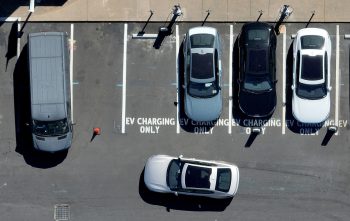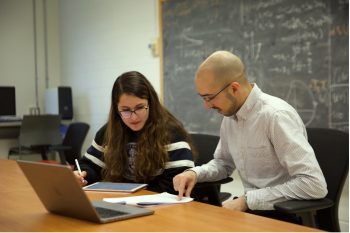When it comes to tackling complex environmental challenges and fostering a culture of sustainability, these U of T Engineering students are generating more than just energy: they are cultivating passion, promoting change and stimulating new ideas.
“Sustainability is a mindset,” said Engineering student Parisa Najafi (MSE 1T6). “It is a way of tackling problems that values efficiency and reduces waste.”
Najafi and fellow students, Deep Prasad (IndE 1T8) and Ashrith Domun (ChemE 1T6) are leading sustainable initiatives through entrepreneurship, industry challenges and education.
Parisa Najafi (MSE 1T6): Generating passion
 Two trees stand in an ice storm: one bends, the other breaks.
Two trees stand in an ice storm: one bends, the other breaks.
While in her first year, third-year materials science and engineering student Parisa Najafi was tasked with discovering why ice affects similar trees differently. She was thrilled. Examining the microscopic structures of birch and quaking aspen fascinated her, and helped her spur a passion for the natural world that has informed her education ever since.
“Nature makes the best classroom,” she said. “It’s hands-on, it’s dynamic, and its designs are usually more elegant and efficient than our own. Lucky for us, nature hasn’t patented anything yet.”
Inspired by her environment, Najafi pursued a collaborative opportunity as a research associate with nanOntario, an outreach program aimed at teaching high school students about bio-inspired technologies. Supported by the Ontario Research Fund For Research Excellence and led by Professor Uwe Erb (MSE), the program brought nature into the classroom as both a teaching tool and an inspiration for students.
“Participating in nanOntario gave me a deep appreciation for nature,” she said. “As a society, we hear a lot about sustainability and climate change. Green energy is one of the hottest fields right now. We have the responsibility as engineers to think critically about these issues because we have the skills to innovate and drive positive change.”
Ashrith Domun (ChemE 1T6): Generating change
 When Ashrith Domun thinks about sustainability, he understands it is a long and bumpy road, but one we will have to travel.
When Ashrith Domun thinks about sustainability, he understands it is a long and bumpy road, but one we will have to travel.
“There is an urgent need to show people that sustainability is important,” said Domun, whose sustainable startup Hydron aims to demonstrate that hydrogen fuel cell buses are now a viable option for fleets, such as the shuttle bus service between U of T’s Mississauga and St. George campuses.
“There are many critics and skeptics of climate change, and we have to motivate them to understand the evidence, and to persuade them that sustainable practices can be beneficial, not only to the environment, but to our economy, too.”
Domun and his co-founders started Hydron through U of T’s Entrepreneurship Hatchery. Their green business model serves as a way to show the public that there are many benefits to fostering sustainable practices on a large scale, including reduced cost and potential for job creation.
“In order to incentivize and promote the adoption of sustainable practices, we have to consider the long term impacts of our decisions,” said Domun.
Hydrogen fuel cells are already in use in some passenger vehicles, including models from Honda, Hyundai and Volkswagen, who choose the technology for its long range, quick refueling and reduced tailpipe emissions. However, incorporating electric technologies into heavy commercial transportation poses unique challenges.
“Ultimately, Hydron works as a business model because the technology already exists. Integrating the right technologies to complement each other and fit customer need is key to widespread adoption and, thus, to substantial environmental benefits.”
Deep Prasad (IndE 1T8): Generating ideas
 You may already recognize Deep Prasad’s name. A top-ten finalist in the Next Einstein Competition and recently named Post City’s Top 20 Under 20, his novel ideas for energy conservation and generation are gaining momentum and garnering public attention.
You may already recognize Deep Prasad’s name. A top-ten finalist in the Next Einstein Competition and recently named Post City’s Top 20 Under 20, his novel ideas for energy conservation and generation are gaining momentum and garnering public attention.
His latest project involves interpreting household utility data to inform improvements to current policy for North American energy usage.
“Technology, as I see it, has two very powerful ways it can affect sustainability,” said Prasad. “The first is by providing data which changes the way we understand our actions and drives us toward positive change. The second is by actually improving the ways we consume energy.”
Prasad is exploring both of these opportunities, leveraging big data to interpret and influence human energy consumption, while also developing technologies that enable smarter use and storage of electricity.
“It shouldn’t take a natural disaster or a drought for us to see how important sustainable practices are. We can use data and statistics to interpret our trajectory and influence policy before we get to that point.”
As Prasad continues to develop novel green technologies, he believes that many of our energy problems could be solved through minor changes to our daily consumption habits.
“In general, we waste far more than we should. From the amount of water used in the average North American shower, to the energy wasted when no one is home, there is a lot of room for improvement. It is important that we change our behaviour instead of just relying on technology to improve efficiency.”



